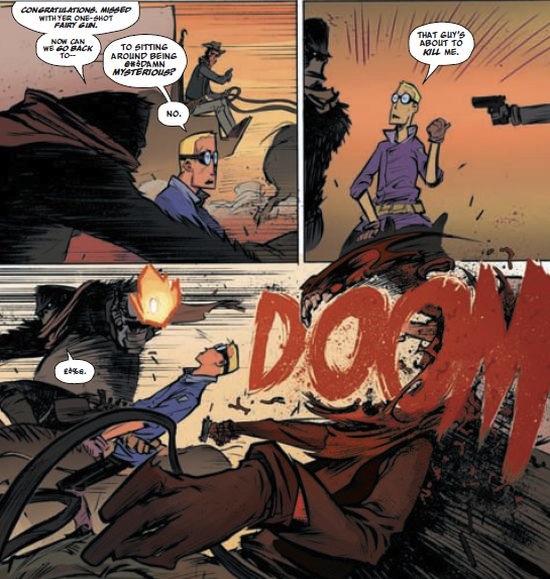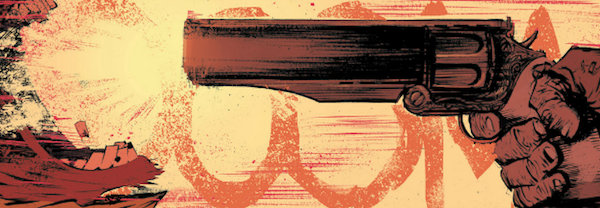Subtext is all well and good, but sometimes it's just better when it's shouted at you by a massive, heavily-armed primate.
Six-Gun Gorilla is something I’ve wanted to write about for a while, but I've been holding off for the last issue. Throughout its run Six-Gun Gorilla has stressed the importance of ending a story, and it seemed only fair to hold off for an ending. I’ll be honest - I didn’t expect or even necessarily want something clever from this book. It’s called Six-Gun Gorilla, for heaven’s sake. It should be the best-selling comic on that alone. And yes, I bought it because of the title, and the artwork appealed, and it seemed a good fit for me. And while Six-Gun Gorilla (6GG from here on out) is a Western with a heavily-armed monkey, that's really the set dressing for a story about the value and nature of fiction, and how fictional and real-world narratives differ.

About that art: Jeff Stokely is a revelation. His style jumps between cartoonish and highly-detailed from panel to panel, with an assurance that belies the fact that he's only been working as a comics artist for a short time. The level of detail controls the pacing of a scene just as surely as panel structure does, the more complex panels holding the eye for far longer than the more simplistic ones. The scene below is a good example.

Aggressive foreshortening and movement recall classic comic artists, and dream / subconscious sequences allow for some nods to other comics, notably Lupin III. Basically, if you value versatile, inventive and assured comic art, Jeff Stokely is your guy.
So, that story. There’s a parallel universe called the Blister, where government and rebel forces fight for control, as they have for generations. Into this are thrust Blues, people drawn from the ranks of the desperate and the suicidal with the promise of money for their families, or a chance to die in dramatic fashion. Implanted with a ‘psychic tumour’, they broadcast the war back to Earth for hungry, bovine audiences. We follow a man just known as Blue, as he negotiates this powerfully hostile environment and decides he wants to live after all.
 Blue is a librarian, a genre / pulp specialist whose obsessive cataloguing of old stories drove him apart from his wife, leaving him ready to die. His awareness of genre is key to the tale, as Spurrier takes the opportunity to berate him, and by implication the reader, for importing pulp and Western tropes to the story that is, after all, just about a sandy frontier full of settlers, warring factions and treachery. Story - Spurrier's Story, possibly all stories - is far too important to leave to lazy clichés to fill in. There's a fantastic scene where Blue "wins" - for an incredibly simplistic version of winning. Bad guys are killed, Blue is left rich, but as perspective draws further and further back, leaving him a speck, he realises how empty this matinee-movie ending is.
Blue is a librarian, a genre / pulp specialist whose obsessive cataloguing of old stories drove him apart from his wife, leaving him ready to die. His awareness of genre is key to the tale, as Spurrier takes the opportunity to berate him, and by implication the reader, for importing pulp and Western tropes to the story that is, after all, just about a sandy frontier full of settlers, warring factions and treachery. Story - Spurrier's Story, possibly all stories - is far too important to leave to lazy clichés to fill in. There's a fantastic scene where Blue "wins" - for an incredibly simplistic version of winning. Bad guys are killed, Blue is left rich, but as perspective draws further and further back, leaving him a speck, he realises how empty this matinee-movie ending is.
Blue sees the world purely through stories, but everyone else in 6GG only watches the never-ending narrative of the war. This is at the core of the tale - Blue must learn focus on his real life, learn that he's not necessarily the protagonist, but his actions also teach others the value that lies in fictional narratives. There is, of course, a certain amount of sci-fi hand-waving needed to create a framework in which this is possible, but it means the story can be told, albeit a touch incoherently at times.

Would it be too much to read that the two forces fighting to continue a story far beyond its natural ending represent Marvel and DC, trotting out unending stories of uncomplicated heroes for fun and profit? Probably, but I’d be surprised if it hadn’t crossed Spurrier’s mind.








